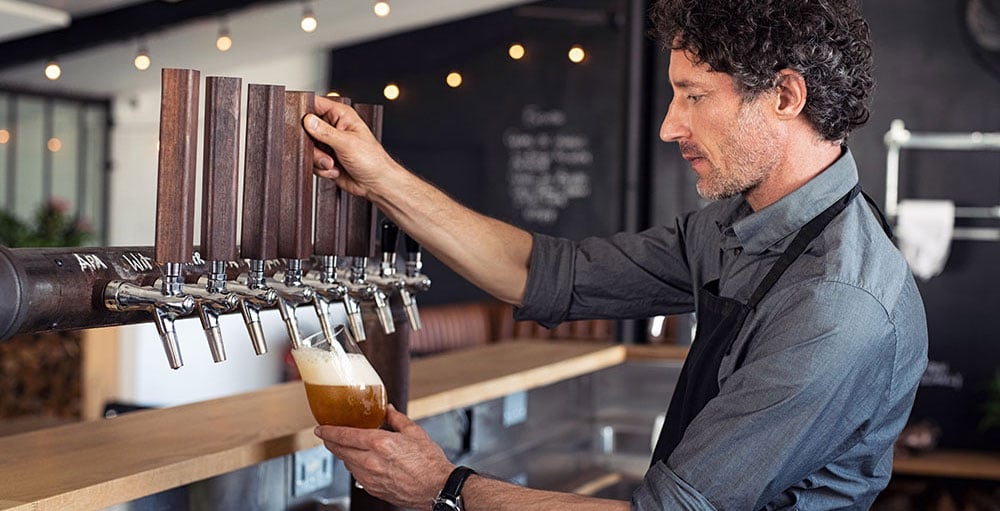Set up new staff — and your business — for success with our guide to training alcohol servers.
If you’re managing a licensed establishment and have recently hired new alcohol servers, you need to be equipped to ease them into the busy bartending routine.
Finding an excellent alcohol server can be a tough job in itself; they need to have an eclectic mix of skills and traits to perform well. Once you’ve found that personable, outgoing, knowledgeable, flexible, quick-thinking person, you need to hold up your end of the employment bargain by helping them succeed in their new role.
Here’s what you need to know about alcohol server training to help set new employees and your business up for success.
Have a bar training manual in place
You should equip new and experienced staff with a training manual or handbook that explains everything from your house policies and rules to the employee code of conduct.
This manual should also contain an array of specific information for alcohol servers, to train them and inform them of everything they may need to know, in the event that they have questions while working and no one is readily available to answer them.
One of the most important sections the manual should cover is drink recipes! Maybe your staff already know how to make a perfect Old Fashioned or a tantalizing Long Island Iced Tea, but if your establishment serves particular garnishes with classic cocktails or has signature drinks on offer, staff need to know exactly how to make these beverages. Customers appreciate consistency — a Caesar should always taste the same and contain the same components no matter which employee makes it and serves it up.
It may seem far-fetched to think employees will sit down and read a manual, especially in a busy bar when they’re eager to hit the ground running. We suggest giving them time while they’re not busy with other tasks to look it over, get familiar with your bar and ask questions.
Bolster staff knowledge with a barback manual
If your establishment is a big or busy one, you likely have barbacks to assist the bartenders. Barbacks perform all those smaller — yet very important — tasks that help the bar run smoothly, such as stocking garnishes and glassware and cleaning drink preparation areas.
Supplement your guide with a barback manual that covers rules — for example, standards of dress and appearance for barbacks — and resources for barbacks to check when in doubt.
Make training practical
On-the-job training is crucial when building up an alcohol server’s skills and confidence. Designate one person to be in charge of training, while the rest of the team supports both the trainer and the trainee. The trainer should be someone who knows the ins and outs of the bar and can translate the written manual to practical tasks.
Make sure feedback given to the new hire is constructive and friendly rather than harsh or purely critical. Everyone makes mistakes — that’s why training is needed! Be patient and understanding, and have clear, achievable metrics for success set up. Consider performing periodic check-in style evaluations with the new alcohol server and let them know how they’re doing and that you’re there to help.
Ensure staff have their Alcohol Server Certificate
While alcohol service laws and regulations around training vary from state to state, we recommend that all licensed establishments require all alcohol servers to have some kind of official training on the responsible service of alcohol.
Before you hire new staff, ask them if they have their Alcohol Server Certificate, whether it’s up to date and what that official training entailed. If they impressed you so much that you want to hire them without this documentation, set them up with a training course before they can start slinging drinks!
An Alcohol Server Certificate shows that a person is trained in the safe and responsible service of alcohol, with the skills to measure standard drinks, monitor customer consumption, assess their BAC and stop service effectively.
Alcohol server training covers topics like:
- effects (positive and negative) of alcohol on the community
- effects of alcohol on the body and mind
- all the pertinent laws and regulations, such as the role of the liquor authority, law enforcement, businesses and their employees
- tips on spotting signs of intoxication, checking IDs and refusing service
Alcohol servers play a major role in protecting the community from the negative effects of alcohol consumption. They’re also your business’s first line of defense against lawsuits and liabilities that can result from unsafe alcohol service.
Userve provides the training alcohol servers need to get the skills and knowledge to safely — and legally — do their jobs. We offer 100% online training that learners can take at their own pace. Easily find the correct Alcohol Server Training Course for your local area and complete training in just a few hours.
Need to enroll three or more staff members? Our complimentary Userve Business Accounts feature bulk enrollment options, a dedicated account manager and an online business portal where you can keep track of each employee’s training progress. Learn more about our Business Accounts and get started today!

